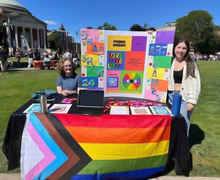Newhouse School receives grant for free speech project from the Koch brothers
Alexa Diaz | Managing Editor
The S.I. Newhouse School of Public Communications was awarded a grant from the Charles Koch Foundation that has some concerned about academic freedom.
Syracuse University has received another grant from the influential billionaire Koch brothers, whose funds are often used to gain political influence.
The S.I. Newhouse School of Public Communications was awarded a grant from the Charles Koch Foundation for $40,008. The money was received by the Tully Center for Free Speech and is funding a series of student-made short films that explore developments in free speech over the last 10 years, said Roy Gutterman, director of the Tully Center.
In the past, funding given to institutes of higher education by Charles and David Koch has been linked with controversy. Some grants come with strings attached, allowing the brothers to dictate specific material to be researched in accordance with their political ideals. Critics argue that interferes with academic freedom.
But Gutterman said the funding the Tully Center received has no strings attached and that he would not have accepted money that was restricted or used to further a political agenda. He is aware the brothers are politically conservative and have used their money in controversial ways in the past, he said.
“That is no secret,” Gutterman said. “… If I could’ve found another entity that would’ve funded a project on free speech, I would have gone to them, too.”
If the university wants to establish a list of foundations that faculty should not approach, that is well within the administration’s authority, Gutterman said. But he said he does not see an issue with receiving this grant from the Kochs.
Still, some faculty members are wary of the university accepting funding from the Kochs.
There has been discussion among faculty members about charging the University Senate Research Committee with investigating whether gifts from the Koch brothers are fully in accordance with academic freedom and to develop guidelines for future acceptance of grants from donors who may conflict with SU values, according to a dossier circulating among faculty.
The Martin J. Whitman School of Management also received a grant from the Koch brothers this academic year, totaling $1.75 million.
Harriet Brown, a professor in the Newhouse School, said accepting money from the Koch brothers makes her nervous. She stressed that she does not know the specifics of the Tully Center grant and did not see the application.
Brown said she wishes there had been a school-wide conversation about accepting money from the Koch brothers, given their history of dictating what topics researchers can study with their grants at institutions such as Florida State University.
“I think it’s ironic that they are giving money to the Tully Center for Free Speech when so much of their agenda seems to be about shutting down free speech,” Brown said.
Even though the grant might not have strings attached, Brown said she questions the Koch brothers’ motive and whether Newhouse wants to be the recipient of that money. Brown said her concern is that the brothers are giving money to the Tully Center so they can point to it later as a defense method, showing they contributed to a liberal institution.
“It’s sort of like, you know, do you take money that was earned from selling blood diamonds because you’re going to do good with it? It’s really a question of ‘do the ends justify the means’ and I personally would say no,” Brown said.
Gutterman said when he applied for the grant, he anticipated there would be criticism, but he welcomes the critics because they are engaging in the free speech discourse the Tully Center advocates for.
Newhouse Dean Lorraine Branham said she had concerns when Gutterman first told her about the grant, but she decided that because the project was an idea developed within Newhouse and the Koch brothers aren’t interfering with academic freedom by dictating the content, she was OK with accepting the money.
“We had an idea, we proposed it and they agreed to fund it and that is basically the end of it,” she said. “… If people who we disagree with or have concerns about actually want to do some good with their money, I don’t have a problem with that.”
Branham said preventing faculty from accepting certain grants may inhibit their freedom to pursue projects. She said she doesn’t want to tell faculty they aren’t allowed to take money from certain foundations just because they may not agree with the people behind the foundations.
David Rubin, former dean of Newhouse, said he thinks as long as there are no strings attached, accepting the money is “perfectly fine” and he is not bothered by the fact that some people don’t like the politics of the Koch brothers.
He said critics who don’t have evidence that the Koch brothers will have influence over the project are hiding behind the statement of academic freedom because they don’t like the Koch brothers, and he finds that to be “intellectually dishonest.”
“The sort of left-wing hysteria that grips many universities and washes over into assuming that everything connected to the Koch brothers or any other of their enemies is bad on its face and should be avoided, that sort of hysteria has to stop,” Rubin said. “Universities need to get a grip.”
Gutterman applied for and received the grant last fall and students have already begun gathering information and conducting interviews to create the short films.
This is the first time Newhouse has solicited money from the Koch brothers, Branham said, and she is not opposed to receiving more funding from them.
“This is something that we are using for the good of our school and the students,” Branham said. “There are no restrictions on it that make us uncomfortable in any way.”
Published on February 14, 2017 at 9:12 pm
Contact Taylor: tnwatson@syr.edu





